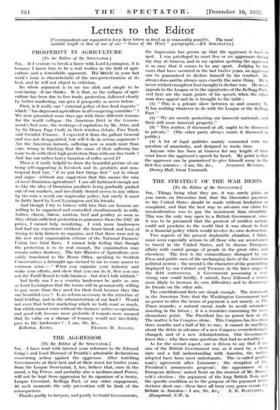THE AGGRESSOR
[To the Editor of the SPECTATOR.] SIR,—I have read with interest your reference to Sir Edward Griggs and Lord Howard of Penrith's admirable declarations concerning action against the aggressor. After watching Governments at their best and at their worst for twelve years from the League Secretariat, I, too, believe that, once in the mood, a big Power, and probably also a medium-sized Power, will not be kept from aggression by its signature of a treaty, League Covenant, Kellogg Pact, or any other engagement. At such moments the only prevention will be funk of the consequences.
Thanks partly to lawyers, and partly to timid Governments, the impression has grown up that the aggressor is hard to spot. I was privileged to meet five or six aggressors during my stay at Geneva, and in my opinion spotting the aggressor is so easy that it ceases to be any sport. Judging by the cases that have occurred in the last twelve years, an aggressor can be guaranteed to declare himself by . his conduct. He always does and he always says exactly the-same thing. He is never wicked enough (or fool enough) to declare war. He never • appeals to the League or to the signatories of the Kellogg Pact, and here are the main points of his speech,:ivhen the other man does appeal and he is brought to' the table : (1) " This is a private show between us and country X. It has nothing whatever to do with the League or the Kellogg Pact." • - (2) " We are merely protecting our innocent nationals, and their still more innocent property."
(3) " This matter, if discussed at all, ought to. be discussed in private." (The other party always wants it discussed in public.) (4) A lot of legal • quibbles mainly connected with the question of unanimity, and designed to waste time.
• Anyone who has been at Geneva for any length of time must know the aggressor's speech by heart. My point is that the aggressor can be guaranteed to give himself away in the first five minutes.—I am, Sir, &e., ANTHONY BUXTON. Horsey Hall, Great Yarmouth.






























 Previous page
Previous page